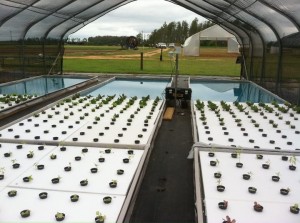The local food movement’s growth has fueled interested in urban farms. For small operations in the extreme west part of panhandle Florida, one production method rising in popularity is raised bed hydroponics. It is simply what the title implies: a raised bed lined with plastic and operated as a hydroponic growing system.
The West Florida Research and Education Center (WFREC) and Dr. Ronnie Schnell, along with educational programs from the Escambia County Extension Service, are gathering data and providing education opportunities for producers interested in diversifying their operation with this technique.
The startup costs are minimal compared to buying large equipment for in-ground production or readymade hydroponic systems from a horticulture supplier. Costs of materials will total $235 or less for a bed that will hold up to 250 plants.
This system does not require a pump (the machine in the photo is for nutrient data collection) and with proper placement, the Styrofoam can block almost all growth of algae. Miracle Gro can be used as the nutrient solution, with an addition of Epsom Salt. The trial has used a tomato solution mixed for greenhouse use with tremendous success.
Several varieties of lettuce and herbs have been growing in the system since installation at the WFREC in August 2011. The system typically holds up to six weeks of production with a harvest at least once a week, depending when transplanted were introduced into the system.
Seedlings typically take four weeks to reach the right transplant stage this system. Few pest and little disease have been encountered to date. One challenge has been proper monitoring of the nutrient solution after significant rainfall events.
Currently, forecast net returns for crops grown in this system indicate a high potential for a profit in the first year of operation. With proper attention to plant nutrition, seedling health, and harvest dates, these pesticide-free lettuce or herb varieties may command top market value.
For more information or questions contact Allison Meharg, Escambia County Extension, 850-475-5230 or allisonm@ufl.edu .
- Food Safety for Your Farm - March 6, 2013
- Food Safety for the Backyard Gardener - October 19, 2012
- Sustainable Vegetable Production Options for Small Operations - June 22, 2012

